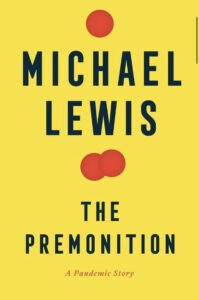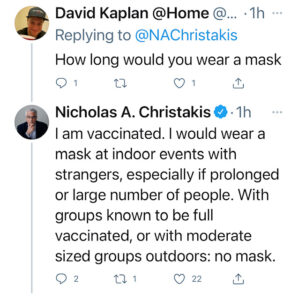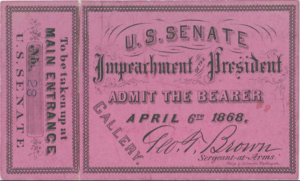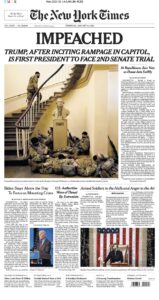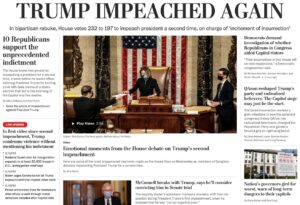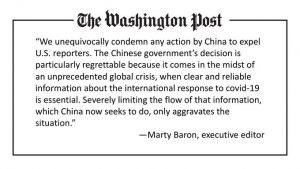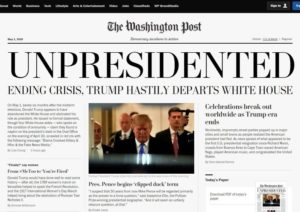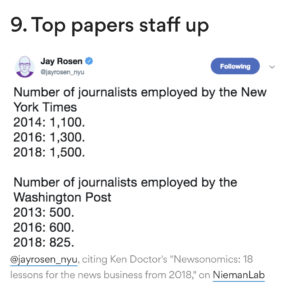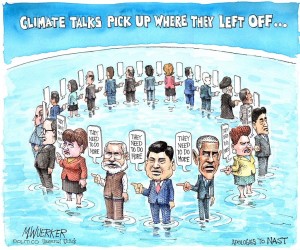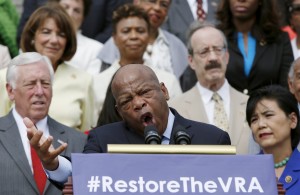Washington Post
ˈtrəst
May 18, 2021Washington Post
| The new mask rules from the C.D.C. amount to an honor system of sorts, where only unvaccinated people are expected to keep wearing masks in most places. But many Americans are wondering whether they can trust others to do the right thing. |
| In social psychology, there’s a well-established principle that a common enemy is supposed to bring people together. But shortly after the pandemic arrived, the U.S. saw a partisan divide over masks, screaming crowds outside state capitols and death threats against health officials. |
| It quickly became apparent that, even in a crisis, Americans were finding it difficult to come together. So it’s no wonder that the federal government’s new mask guidance has been greeted with reluctance — especially when fewer than half of Americans over 12 are fully vaccinated. |
| Celeste, a newsletter reader from Dayton, Ohio, wrote in with her own experience. |
| “The first day of The Great Unmasking at work went exactly as you’d expect: people who have previously bragged about not being vaccinated walking around without masks on,” she wrote. “Assuming people would act unselfishly to protect others goes against everything we’ve seen so far this pandemic.” |
| The C.D.C. is also asking Americans to trust one another at a time when faith in institutions and their neighbors is particularly fragile. According to a 2019 Pew Research Center report on Trust and Distrust in America, trust in the federal government was near record lows, and seven in 10 people said they thought that Americans’ trust in one another had declined over the past 20 years. |
“Betrayal is the wound that cuts the deepest.”
Boise State Public Radio
Most people in the Mountain West are still unvaccinated. Idaho has the second-lowest rate in the region with only 34% of its residents getting one or more doses.
COVID-19 vaccine supplies are now abundant – nationally about 60% of adults have had at least one shot.
“At least here in Casper, (Wyo.), you can go to the clinic and pick one of the three vaccines. It’s like a menu: I want Moderna, I want Pfizer, I want Johnson & Johnson. We have that much vaccine now,” said Mark Dowell, an infectious diseases physician and Natrona County health officer.
Even so, most people in the Mountain West are still unvaccinated. And Wyoming has the region’s lowest vaccination rate with about a third of residents with at least one shot. Idaho is a close second at about 34% of its residents with one or more doses.
To achieve herd immunity, epidemiologists have suggested we need about 70% of people to be immune, though that number is hard to pin down without more research.
Dowell said we also don’t know how many people actually were infected with COVID-19, how many of those built up antibodies, and how long those antibodies might last.
“We think that for every one infection, there may have been one or two more that had symptoms that went undetected,” he said.
Even if we could figure out how many were infected, he said we still have one big unanswered question: “Of the people that had the infection but didn’t know it, did they get good protection from their immune system to add to our herd immunity?”
We also don’t know how long the vaccines will stave off the virus, though many expect them to offer protection for at least a year.
Dowell says it could take several months to figure out how much of the virus we’ve stopped, saying, “The proof of the pudding will be next fall and winter when everybody’s inside again.”
At the same time, areas with low rates of immunity and high rates of spread could allow the virus to mutate into a more dangerous strain.
“That’s another reason to get vaccinated, to head off the mutations,” he said. “The worry is that you’ll find a variant eventually that will not really be covered by the vaccines.”
Dowell said he is continually talking to patients who believe in false conspiracy theories about the vaccine, ranging from it causing infertility to vaccines actually being tracking microchips from Bill Gates. At the same time, he still hopes he can convince more people to get it.
“When you’ve seen people die horrible deaths from COVID, it changes your perspective on things,” he said. “I had a close, healthy friend that died of COVID way before we had the vaccines. And it was a rough death. I sat at his bedside as he died, as we took him off the ventilator … it’s rough.”
Guest essay on why novelty means severity, and why so many questions about variants, children, Long Covid, endemicity and more revolve around that very notion by Dylan Morris, PhD.
. Nothing in this pandemic makes sense except in the light of novelty.
‘…wealthy countries have two choices for how the global pandemic ends: via natural infection or via vaccination. We should choose vaccination.’
‘Remembering that novelty means severity helps us see that the vaccines provide cause for hope, even if SARS-CoV-2 manages to stay with us for years. SARS-CoV-2 might stick around; the COVID-19 pandemic will struggle to do so.
But it also makes clear that those of us in wealthy countries have two choices for how the global pandemic ends: via natural infection or via vaccination. We should choose vaccination. And we must commit to that choice now. We don’t have much time.’
https://www.theinsight.org/p/novelty-means-severity-the-key-to
I continue to think where we’d be as a country right now with this pandemic if it had not been allowed, and encouraged, to become political. Hundreds of thousands did not need to die. -dayle
“One day some historian will look back and say how remarkable it was that these strange folk who called themselves ‘Americans’ governed themselves at all, given how they went about it.” -Michael Lewis [p.78.]
💯%: “…this was a major blunder that threatens to set back much of the progress made. President Biden needs to fix it, urgently […] for the public good.” -Dr Leana Wen
While many people happily shed their masks and celebrated the apparent end of the pandemic, others are concerned that with only 37 percent of the country fully vaccinated, this relaxation is premature and could lead to a resurgence of infections
The CDC’s mask guidance is a mess. Biden needs to clean it up.
This was an astounding strategic and tactical mistake. It will have lasting repercussions unless the White House steps in to clean up the CDC’s mess. As a start, the administration should clarify that while vaccinated people are generally not at risk, the unvaccinated are still at high risk. Therefore, if there is no reliable way to verify vaccination status, indoor mask mandates must still remain in place.
“We do not have enough vaccinated; we are seeing frequent emergence of new variants[…]Relaxing NPIs (masks/distancing) before adequate vaccine coverage could result in tremendous loss of potentially averted cases, hospitalizations & mortality.” -Dr. David Pate, Idaho Covid Task Force
Please. Just a little while longer.
😷😷😷😷😷😷😷😷
This is the only herd we’re going to have if you don’t vaccinate.
X2
January 13, 2021Time to put on your big boy pants, Mitch.
232-197
“No president has ever had so many members of their own party vote to impeach them.”
-Young journalist Gabe Fleisher
https://www.wakeuptopolitics.com
From an overnight streaming post on social media from Rep. Alexandria Ocasio-Cortez, speaking to the nihilism of white supremacist violence:
“What claim will you have? That you rule over a destroyed society? That the ashes belong to you?”
‘When black people and their allies exercise freedom of speech, it is called violent insurrection. When white racists carry out violent insurrection, it is called free speech.’
Members of the National Guard rest below the iconic painting of our first president, on the day Congress impeached the 45th.
And the headline we never got to see.
Journalism in the Time of Corona
March 17, 2020Seattle Times
From the editor: As we face the coronavirus challenge together, thank you for your support
While the region mobilizes to respond to the spread of COVID-19, I want to take a moment to thank you for your support. So many of you have reached out to me and our news staff with your tips, questions and gratitude for our coronavirus coverage. We have been working hard to bring you the most current, factual information on this quickly evolving crisis.
It’s been two astonishing weeks — for all of you, and for all of us.
In my 35 years as a journalist, I can say I’ve never felt so keenly the importance of local journalism to our community. And in my 27 years at The Seattle Times, I’ve never seen the entire company rally behind our mission the way we are now.
We are working at a breakneck pace to report rapidly changing news developments such as closures, new cases and travel restrictions. We are asking tough questions to hold officials accountable, while also telling of the extreme challenges they face. We’re capturing moments of heart-wrenching struggle and uplifting acts of kindness.
And we are intently focused on providing you with the resources you need to navigate this unsettling time: things like tips for keeping your home virus-free, and this detailed graphic explaining how the virus takes hold and the steps you can take to stay safe.
Many of you have asked what we’re doing to safeguard the health of our staff and the public.
While we don’t pretend to have all the answers — no one does — we’re doing our best. For the first time ever, every newsroom employee is working remotely from home, as are all company employees who are able to do so.
For those who must go out to do their jobs, we are taking extra precautions.
We’ve told all Times employees, including our reporters, photographers and video journalists, to avoid areas where someone has tested positive for COVID-19, and we’ve shared public health guidelines such as keeping a distance of 6 feet or more from people whenever possible. We opted not to provide masks, after health officials advised against their use for healthy people. But we have provided hand sanitizer and have bought special protective gear for those who need it to report from inside hospitals or other high-risk places.
For our operations and circulation staff, as well as our carriers — who don’t have the option of working from home — we are taking every step we can to safeguard their health.
Our staff is fueled by your support. The kind notes, calls and social media messages we are receiving each day have kept us going at moments when we’ve felt exhausted, worried or discouraged.
We’re also heartened to see how many people are coming to us to stay informed. Readership of our website has been triple our normal volume — even 10 times the volume at key breaking-news moments. And despite the fact that we’ve made our coronavirus stories free as a public service, this coverage has drawn new subscribers at record levels.
That’s critical, especially given the fact that while the world feels changed, the economic challenges facing the news business remain the same. If you don’t already subscribe but want us to continue fulfilling the critical role of informing you, please consider joining us in this mission by subscribing. You can do so at seattletimes.com/subscribe or by calling 206-464-2121 or 800-542-0820.
As we head into uncertain times, here are some free useful resources to keep handy:
- Our daily live updates. You can find these on seattletimes.com each morning with need-to-know breaking news and information updated throughout the day.
- A visual guide outlining facts about COVID-19 and precautions on how to stay healthy.
- And a page where you can find all of our reporting on this topic, with the latest coverage at the top.
Additionally, if you have news tips, story ideas or feedback on any of our coverage, please email us at newstips@seattletimes.com.
For all of us, living in this new reality means adapting very suddenly to new routines. We’ve certainly felt that ourselves, and unlike with many big news stories we cover, we are experiencing this one right along with the people we’re writing about.
In fact, that’s one positive side effect of this pandemic: We’re becoming more empathetic by the day, and we see you doing the same.
I’d love to hear from you if you have thoughts or questions for me personally. Feel free to write me at michmflo@seattletimes.com.
On behalf of all of us at The Times, I share our deep appreciation for your continued support of us, and of local journalism.
Stop the guns. #enough
August 12, 2019[Washington Post]
The ego loves to take sides, and the longer and more vigorously it justifies its side, the more it feels like this is surely truth. Soon my truth easily morphs into the truth and even the only truth. We end up not with orthodoxy but with egocentricity. This is invariably what happens when we have not been exposed to perennial philosophy, when we are not taught how to distill the big patterns out of the momentary arguments where everyone takes sides, when we cannot distinguish the small, separate self and the self created by God and one with God, from all eternity.
-Richard Rohr, Center for Action & Contemplation
The Yes Men (Did it again.)
January 16, 2019This was supposed to be real.
This was not. (How I wish.)
‘Fake editions of the Washington Post with a large headline announcing DT’s departure from the White House were passed around Washington DC early Wednesday morning by a group of activists.
The paper, which was printed on a broadsheet eerily similar to the real Washington Post, was dated 1 May 2019 (with a high in DC of ’79’) and included a series of anti-Trump and women empowerment stories. The stories and a PDF of the spoof newspaper were also published on a website that imitated the Washington Post’s homepage.
“Trickster activist collective” the Yes Men revealed they were the organization behind the prank newspaper later Wednesday following initial confusion on who was behind the paper.
The Yes Men have conducted similar stunts before, passing out a satirical of the New York Times in 2008 with the headline “Iraq War Ends” and a similar fake edition of the New York Post in 2009 about climate change around New York City.’
https://www.theguardian.com/media/2019/jan/16/washington-post-spoof-papers-trump-dc
The Yes Men are a culture jamming activist duo and network of supporters created by Jacques Servin and Igor Vamos. Through various actions, the Yes Men primarily aim to raise awareness about problematic social and political issues. [wikipedia]
Journalism Elitism
December 21, 2018The rise of paywalls means that high quality information will funnel to elites: As the digital advertising landscape continues to evolve, it’s becoming evident that digital ad dollars will continue to flow primarily to tech platforms rather than news publishers.
- Because of this, publishers are setting up paywalls (subscriptions, members, etc.) to survive. And while more Americans say they are willing to pay for news, those with higher levels of education are more likely to do so. In all, 66% of adults with a college degree pay for news, compared to 43% of people with a high school diploma or less.
“There is a growing gap in public knowledge between the information-rich and the information-poor,” says Rodney Benson, chair of NYU’s Department of Media.
[reposted from AXIOS]
“In October, the University of North Carolina’s School of Media and Journalism released a study that estimated that a full 20 percent of all local newspapers have gone out of business or merged since 2004. Since then, an additional 1,300-plus communities in the United States have found themselves without any news source about their own city, town, or county. “Our sense of community and our trust in democracy at all levels suffer when journalism is lost or diminished,” the authors of the report wrote. “In an age of fake news and divisive politics, the fate of communities across the country—and of grassroots democracy itself—is linked to the vitality of local journalism.”
Deep-Fake Video. It’s real.
September 11, 2018
|
| https://ethicaljournalismnetwork.org/fake-news-more-dangerous |
|
Finally, in publicizing the dangers, media need to avoid a tone of hopelessness — “Soon we may never know what is real and what isn’t.” Quality media outlets need to emphasize how carefully they vet video. They should make sure their ethics codes and verification procedures adequately address the dangers. Otherwise, audiences will doubt any video — including legitimate and important footage that media outlets gather in their own breaking-news coverage and investigative work
BLM – A Focus on Policy
May 11, 2017[Washington Post]
By Janell Rosee & Wesley Lowery
In recent years, policing has been among the nation’s most visible issues as people outraged by use of force and racial disparities in punishment took to the streets under the “Black Lives Matter” banner. But activists say the movement’s efforts have entered a new phase — one more focused on policy than protest — prompted by the election of President Trump.
“What people are seeing is that there are less demonstrations,” said Alicia Garza, one of three women credited with coining the #BlackLivesMatter hashtag. “A lot of that is that people are channeling their energy into organizing locally, recognizing that in Trump’s America, our communities are under direct attack.”
[…]
Activists say they’re no less aware of those statistics than in years past. But like most of the political left, they were stunned by Trump’s electoral victory in November. And in the months since, they’ve grappled with the role of an antiracism movement at a time when political threats to other groups — immigrants, Muslims and women — have gained urgency and pushed more progressives into the streets in protest.
In interviews, more than half a dozen leaders in the Black Lives Matter movement said that last year’s presidential election prompted renewed focus on supporting other minority groups as well as amassing electoral power to fight an administration that has pledged to roll back Obama-era efforts to reshape policing practice. Those leaders — who hail from various factions of the decentralized movement of individuals and organizations that have, at times, clashed — said the reality of Trump’s presidency has forced a reconsideration of strategy.
“There was a lot of regrouping that had to happen within our movement and on the broader left to really think strategically,” said Asha Rosa, the national organizing co-chair for the Black Youth Project 100.
Gilgamesh ’45’
February 19, 2017In the Assyrian tale of Gilgamesh, over seven thousand years old, the lost and empty king doesn’t listen to the pain in his heart and so mistakenly declares war on Nature, projecting his pain as something to be conquered in the world.
How many times do we project our pain onto the world, rather than face the emptiness in our heart? How many times have we all been given a sign of what might help us find our way only to smash the sign, out of grief, impatience, or anger?
Projecting our pain, grief, impatience, and anger on others, abdicating our gifts to please a loved one, rejecting new learning because it challenges what is familiar, exiling others because they threaten our position or identity, and denying difficulty in hopes that it will go away – – these are all form of not listening that can undermine our aliveness in any given moment.
-Mark Nepo
Washington Post
All would be well, he said, so long as the people made sure always to elect political leaders who were “wise and good.”
By the time we reach ancient Greece, philosophers like Plato start to offer formal definitions of the tyrannical soul, and the picture is one of the person who defrauds freely, takes violently, lies consistently, robs and kills. Think of ’45’ saying last year about terrorism suspects, “You have to take out their families.” Think of his remark, “I could stand in the middle of Fifth Avenue and shoot somebody, and I wouldn’t lose any voters.”
For many years, I’ve taught Plato’s “Gorgias” and “Republic,” where the tyrannical soul is described. Never did I think we would have a walking, talking example from American politics in front of us 24-7. But here we are. I don’t invoke ’45’ when we discuss passages about the tyrant in those texts. But the comparisons are so obvious that after class my students tend to make small, quiet remarks to me about it.
While the institutions of constitutional democracy were invented to make it easier to rein people in, those who did the work of drafting the Constitution never thought that institutions alone could solve the job. On the cusp of the Constitution’s ratification, founder James Wilson paused to ponder what it would take for the reorganized representative democracy to succeed. All would be well, he said, so long as the people made sure always to elect political leaders who were “wise and good.” The president and other elected officials, he pointed out, would populate the bureaucracies of the new nation. If they themselves were wise and good, they would also populate all the offices of the country with the wise and good. If they were not, then corruption would spread through the entire system.
This election has moved past questions of ideology and partisan position to fundamental elements of the human condition, elements so fundamental that we can find them recorded in the earliest human texts. From the beginning of human history, when tyrannical souls have acquired power, the people have found themselves groaning and crying out with laments under the burden of it.
Character matters because it is how we restrain the inner would-be tyrant in each one of us. It matters because it is how we limit the placement of great power in the hands of those with tyrannical instincts and appetites. If we’ve given up a commitment to character, we’ve already given up the game or, to speak more precisely, the work of protecting freedom, equality and human flourishing.
-Danielle Allen/Political Theorist at Harvard University
It must happen…now.
December 1, 2015COP21: The Paris climate change conference
The Washington Post
‘Congress’s long history of doing nothing on climate change, in 6 acts’
Congress must act if the United States wants to avoid the worst impacts of climate change, say climate activists such as the Environmental Defense Fund. But right now, those activists have basically no realistic hope for any such action.
The make-up of Congress — the fact that it’s Republican-controlled and the GOP is more concerned about the adverse economic impact of trying to mitigate climate change — would suggest why.
Republicans, who don’t have a clear way to block any agreement President Obama signs in international climate talks in Paris, are instead putting up a series of roadblocks and voting to roll back his plans to curb emissions back home.
(read more…)
Rep. John Lewis
September 14, 2015John Lewis is a congressman from Georgia. He was the chairman of the Student Nonviolent Coordinating Committee, was a leader of the Selma-to-Montgomery march for voting rights in 1965 and is the last surviving speaker from the historic March on Washington.




